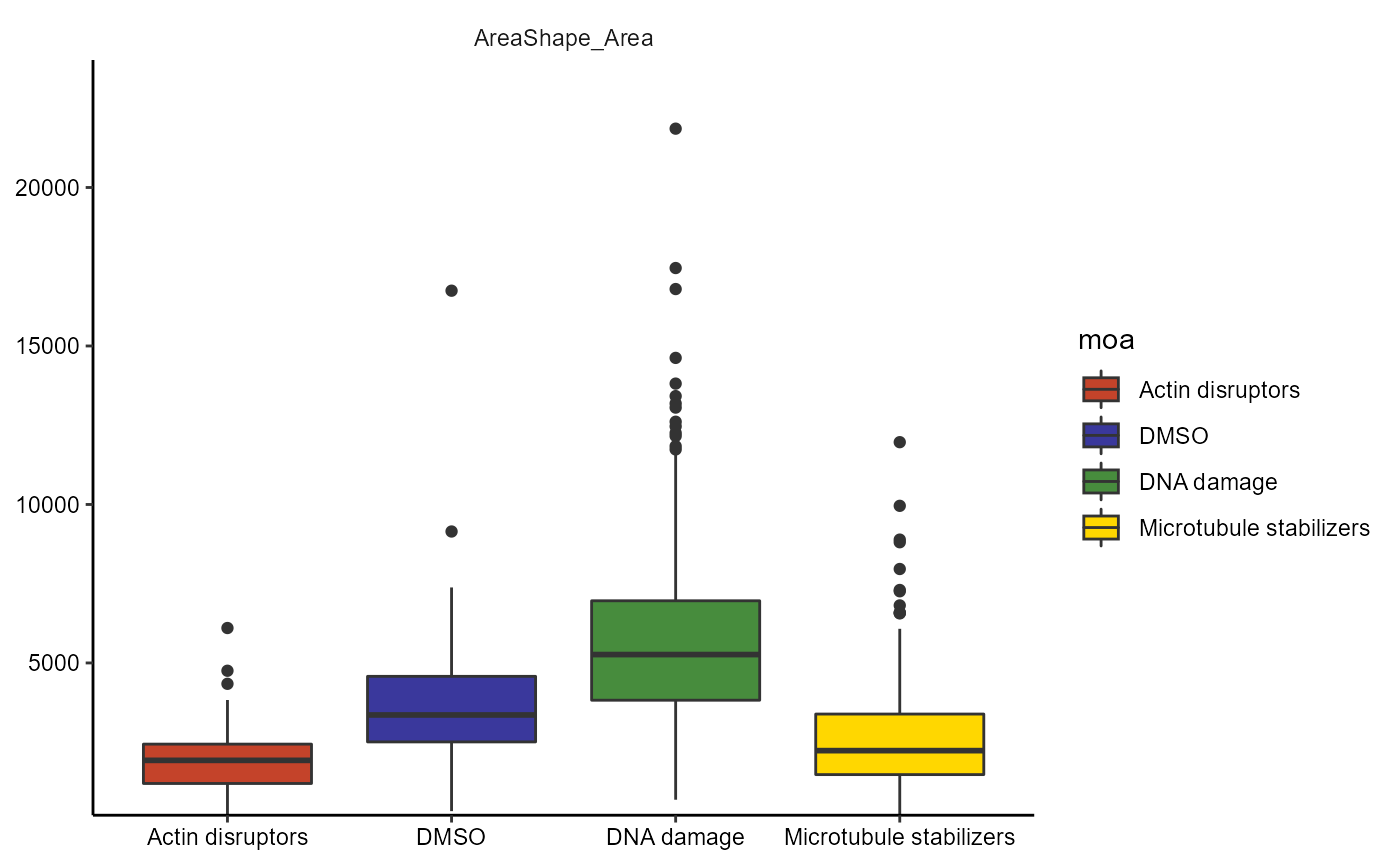1. Adding grouping variables
Using the functions introduced in the tutorial on how to extract data you can use cypro extern pipelines to continue your analyis. This might result in new grouping variables that you would like to add to the original cypro object and to integrate in the cypro workflow. You can use the function addClusterVariables() or addMetaVariables() for that matter. They join the data variables in accordance to the joining family of funcions of the dplyr-package.
# your individual analysis resulted in a data.frame containing a new cluster variable
head(example_df)## # A tibble: 6 x 2
## cell_id example_cluster_variable
## <chr> <fct>
## 1 CID_51_WI_B2_1_WP_1 Cluster_1
## 2 CID_58_WI_B2_2_WP_1 Cluster_2
## 3 CID_79_WI_B2_2_WP_1 Cluster_2
## 4 CID_178_WI_B2_2_WP_1 Cluster_2
## 5 CID_253_WI_B2_2_WP_1 Cluster_2
## 6 CID_43_WI_B2_3_WP_1 Cluster_1
# current cluster variables in the cypro object
getClusterVariableNames(object)## [1] "hcl_euclidean_ward.D_k_4_(voi)" "pam_euclidean_k_4_(voi)"
# add new variables
object <-
addClusterVariables(
object = object,
input_df = example_df,
variable_names = "example_cluster_variable",
by = "cell_id"
)
# new cluster variables
getClusterVariableNames(object)## [1] "hcl_euclidean_ward.D_k_4_(voi)" "pam_euclidean_k_4_(voi)"
## [3] "example_cluster_variable"The same works for variables that are not actual clustering results but are still grouping variables. These are stored in the meta data slot. An example data.frame whose content you might want to integrate in your cypro workflow might look like this.
# data.frame that groups conditions into mechanism of action
moa_df## # A tibble: 39 x 2
## condition moa
## <chr> <fct>
## 1 PP-2 Epithelial
## 2 emetine Protein synthesis
## 3 AZ258 Aurora kinase inhibitors
## 4 cytochalasin B Actin disruptors
## 5 ALLN Protein degradation
## 6 mitoxantrone DNA replication
## 7 AZ-C Eg5 inhibitors
## 8 MG-132 Protein degradation
## 9 AZ841 Aurora kinase inhibitors
## 10 docetaxel Microtubule stabilizers
## # ... with 29 more rowsThis data.frame needs the variable condition as key which is why we have to add them to the meta data of the cypro-object.
getMetaDf(object)## # A tibble: 1,250 x 3
## cell_id cell_line condition
## <chr> <fct> <fct>
## 1 CID_51_WI_B2_1_WP_1 MCF7 DMSO
## 2 CID_58_WI_B2_2_WP_1 MCF7 DMSO
## 3 CID_79_WI_B2_2_WP_1 MCF7 DMSO
## 4 CID_178_WI_B2_2_WP_1 MCF7 DMSO
## 5 CID_253_WI_B2_2_WP_1 MCF7 DMSO
## 6 CID_43_WI_B2_3_WP_1 MCF7 DMSO
## 7 CID_108_WI_B2_3_WP_1 MCF7 DMSO
## 8 CID_228_WI_B2_3_WP_1 MCF7 DMSO
## 9 CID_194_WI_B2_4_WP_1 MCF7 DMSO
## 10 CID_207_WI_B2_4_WP_1 MCF7 DMSO
## # ... with 1,240 more rows
object <-
addMetaVariables(
object = object,
input_df = moa_df,
variable_names = "moa",
by = "condition"
)
getMetaVariableNames(object)## [1] "cell_line" "condition" "moa"
getMetaDf(object) %>%
group_by(moa, condition) %>%
slice_sample(n = 1)## # A tibble: 5 x 4
## # Groups: moa, condition [5]
## cell_id cell_line condition moa
## <chr> <fct> <fct> <fct>
## 1 CID_79_WI_B3_4_WP_3 MCF7 latrunculin B Actin disruptors
## 2 CID_35_WI_C2_2_WP_3 MCF7 DMSO DMSO
## 3 CID_68_WI_F3_3_WP_6 MCF7 chlorambucil DNA damage
## 4 CID_82_WI_F3_4_WP_7 MCF7 etoposide DNA damage
## 5 CID_19_WI_E2_4_WP_2 MCF7 taxol Microtubule stabilizersAll variables added this way are accessible from all cypro functions.
getGroupingVariableNames(object)## [1] "cell_line" "condition"
## [3] "moa" "hcl_euclidean_ward.D_k_4_(voi)"
## [5] "pam_euclidean_k_4_(voi)" "example_cluster_variable"
## [7] "well_plate_name" "well_plate_index"
## [9] "well" "well_roi"
plotBoxplot(object, variables = "AreaShape_Area", across = "moa")
Figure 1 Variable ‘moa’ (mechanism of action) is now accessible from all cypro functions.